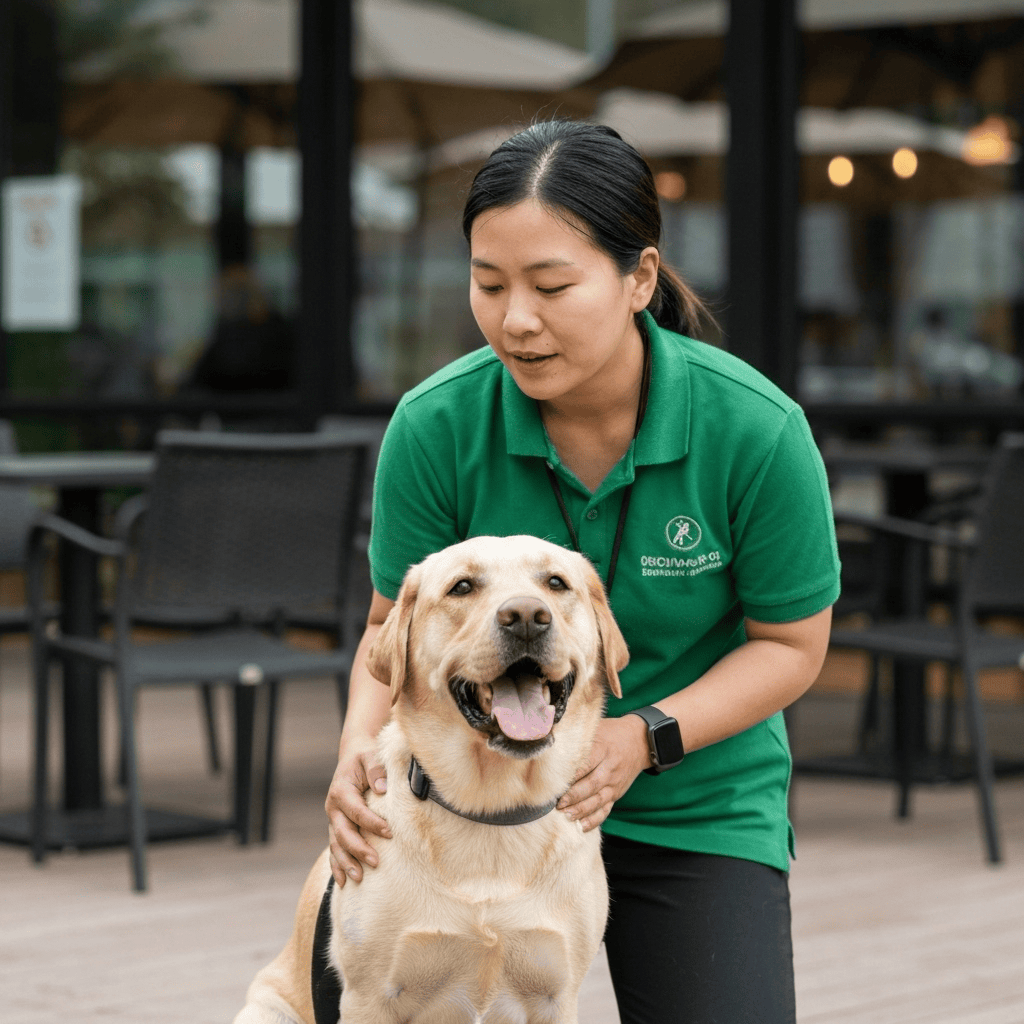Your Complete Guide to Choosing a Dog Trainer in Maryland
Living in Maryland means your dog needs to handle everything from busy Baltimore streets to crowded beaches at Ocean City. Whether you’re navigating the DC suburbs with your puppy or exploring Annapolis with an older rescue, finding the right trainer makes all the difference.
The best trainers here understand that Maryland dogs need real-world skills. They know about apartment living in Montgomery County, the chaos of Inner Harbor festivals, and how to practice good manners at Chesapeake Bay beaches where other families are trying to relax too.
How to Choose the Right Trainer
Positive reinforcement training works best for Maryland families because it builds confidence instead of fear. Your dog learns to make good choices around the distractions they’ll actually face, like kids on bikes, other dogs at farmers markets, and crowds at outdoor concerts.
Most Maryland households do well with in-home training, especially if you live in a townhome or condo where barking complaints can create real problems with neighbors. Your trainer can work on the specific issues that happen in your space, like polite greetings when visitors arrive or staying calm when delivery trucks rumble past your window.
Group classes help with social skills and give you a chance to practice around other dogs in a controlled setting. Board and train programs can jump-start progress, but make sure you get plenty of coaching time so the training actually sticks when your dog comes home.
Look for trainers with recognized credentials like KPA-CTP, CPDT-KA, CTC, or IAABC-CDBC. If you’re not familiar with these certifications, check out this guide to dog trainer certifications to understand what they mean.
Ask how they’ll help you practice in real Maryland settings. Will they meet you at a local park to work on recall? Do they understand the rules at state parks where you like to hike? Can they help your dog learn elevator manners if you live in a high-rise?
Common Dog Training Methods You’ll Encounter

Maryland trainers who get lasting results focus on teaching dogs what TO do instead of just correcting what they shouldn’t do. Here’s what good training programs usually include:
Basic obedience and city manners cover the essential skills every Maryland dog needs. Sit, down, stay, and reliable recall keep your dog safe around traffic and crowds. Loose-leash walking makes those long strolls through Federal Hill or around the harbor actually enjoyable instead of a constant battle.
Puppy training goes way beyond housebreaking. Good puppy classes help your young dog learn to handle vet visits, grooming, and all the sights and sounds of Maryland life. Early socialization now prevents bigger problems later when your puppy encounters everything from construction noise to busy sidewalk cafes.
Behavior modification takes a gradual, scientific approach to issues like reactivity, fear, or resource guarding. If your dog barks at other dogs or gets anxious during thunderstorms, a structured plan using desensitization and counter-conditioning can help them feel more confident.
Avoid trainers who rely on intimidation, shock collars, or dominance theory. These old-fashioned methods often make problems worse and can create new fears. Maryland dogs do best with patience and clear communication.
Maryland Rules Every Dog Owner Should Know
Understanding local laws helps you train effectively and avoid problems with neighbors or authorities.
Leash laws vary by county and city since Maryland doesn’t have one statewide rule. Most places require leashes in public spaces, but penalties and enforcement differ. Anne Arundel County might handle violations differently than Frederick County, so check your local ordinances.
State parks welcome leashed dogs in many areas, but each location has specific rules about where dogs can go and what activities are allowed. Before planning training sessions at your favorite trail, review the current guidelines at Maryland DNR pets in parks.
Dog licensing happens at the county level, and requirements vary significantly across the state. Montgomery County has different rules and fees than Baltimore County. For example, you can find Montgomery County’s current requirements at MCASAC pet licensing.
Rabies vaccination is required statewide for all dogs. Keep current certificates handy since you’ll need them for licensing, boarding, and sometimes dog park access. The Maryland Department of Agriculture maintains updated information at Maryland Department of Health - Rabies Info.
Noise ordinances in many Maryland communities can result in citations for excessive barking. Good training includes management strategies and enrichment to prevent your dog from becoming a neighborhood nuisance.
If your trainer wants to hold classes in public parks, they may need permits depending on local rules. Professional trainers should handle these requirements, but it’s worth asking how they ensure compliance.
What You Can Expect to Pay for Training in Maryland
Maryland training costs reflect the state’s mix of urban, suburban, and rural areas. Prices tend to run higher near Washington DC and downtown Baltimore, while more rural counties often have lower rates.
| Service Type | Typical Price in Maryland | Notes |
|---|---|---|
| Group classes, 4 to 6 weeks | $160 – $320 | Puppy classes and basic obedience in community venues |
| Private lessons, 60-90 minutes | $110 – $200 per session | In-home dog training often at the higher end |
| Puppy training package, 4-6 visits | $380 – $750 total | Potty training, socialization, foundation skills |
| Day training, 2-5 days per week | $500 – $1,000 per week | Trainer works the dog, then coaches you |
| Board and train, 2-4 weeks | $2,300 – $4,800 total | Verify daily handling, updates, and go-home lessons |
| Behavior consultation | $150 – $275 initial | Reactivity, fear, or aggressive dog training plans |
Many trainers offer package deals that reduce the per-session cost. Some provide a free consultation or evaluation before you commit to a full program. Ask about travel fees if you live in a more remote area, and clarify what happens if you need to reschedule sessions.
Questions to Ask Before Hiring a Trainer
The right questions help you find someone who truly understands your goals and your dog’s needs:
- What training methods do you use, and how do you keep sessions positive and low-stress?
- What credentials do you hold, such as CPDT-KA or KPA-CTP?
- How will you tailor a training program to my home, neighborhood, and schedule?
- Do you offer group classes, private lessons, or day training, and which fits my goals?
- How do you track progress and decide when to add distractions?
- What is the total cost, and what happens if I miss or reschedule a session?
- Do you carry liability insurance, and can you share proof?
- If behavior issues are complex, do you coordinate with veterinarians?
- What daily practice do you expect from me between training sessions?
A good trainer will answer these questions directly and help you understand exactly what to expect from their program.
Maryland Resources Every Dog Owner Should Know
These local resources make training easier and give you places to practice what you’re learning:
Montgomery Parks Dog Parks offers multiple fenced areas where dogs can play off-leash and practice recall in a safe environment.
Howard County Dog Parks provides several locations with different amenities and membership options for some facilities.
Prince George's Animal Services lists information on licensing your pet.
Paw Point at Lake Roland is a popular membership-based off-leash area in Baltimore County with trails and water access.
Maryland DNR Pets in State Parks shows where leashed dogs are welcome on trails and in camping areas throughout the state.
Assateague Island National Seashore pet policy explains beach access rules and seasonal restrictions for one of Maryland’s most popular coastal destinations.
Business and Insurance Considerations
Maryland doesn’t require a special state license for dog trainers, but professional standards still matter. Good trainers carry general liability insurance to protect both themselves and their clients if something goes wrong during a session.
Facilities that offer boarding or overnight training may need additional county permits and higher levels of insurance coverage. When you’re evaluating trainers, ask about their insurance and how they handle safety during group activities or when working with reactive dogs.
Some trainers also carry commercial auto insurance if they travel to clients’ homes, and workers’ compensation if they have employees. These details show that you’re working with someone who takes their business seriously.

Common Questions About Dog Training in Maryland
How much does in-home dog training cost?
Most Maryland families pay between $110 and $200 per private session, depending on where you live and how experienced your trainer is. Sessions near DC and Baltimore typically cost more than those in rural areas. Package deals often bring down the per-visit price.
Is in-home dog training worth it?
Yes, especially if your dog’s issues happen at home or if you live in an apartment or townhome with specific challenges. In-home training lets your trainer see exactly what’s causing problems and work on solutions in the environment where you actually need them. It’s also more convenient for busy families and helps ensure that training fits your real daily routine.
Can you pay someone to house train your dog?
Day training or board and train programs can help establish housebreaking routines, but success depends on consistent follow-through at home. The trainer can teach your dog the basics, but you’ll need to maintain the schedule and reward system to make it stick long-term.
What is the 3-3-3 rule for dog training?
This guideline suggests that new dogs need about 3 days to decompress from big changes, 3 weeks to learn your routine, and 3 months to fully settle into their new life. Maryland trainers often structure programs around this timeline, starting with basic management and gradually introducing more challenging skills as dogs gain confidence.
How long will it take to reach my training goals?
Basic obedience skills like sit, stay, and loose-leash walking typically take 4 to 8 weeks with daily practice. Behavior issues like reactivity, separation anxiety, or resource guarding usually require several months of consistent work. Your trainer should give you realistic timelines based on your dog’s age, history, and the specific behaviors you want to change.
What should I bring to group classes?
Pack a flat collar or harness, a standard 6-foot leash, lots of small treats your dog loves, poop bags, and water. Bring vaccination records if the facility requires them. Leave retractable leashes at home since they make training harder and can be dangerous in group settings.
What’s the leash law in Maryland?
Maryland doesn’t have one statewide leash law, so rules vary by county and city. Most public spaces require leashes, but enforcement and penalties differ across jurisdictions. State parks have their own specific policies listed at Maryland DNR pets in parks.
Do I need a dog license in Maryland?
Licensing requirements are handled locally, and most counties and cities do require licenses. The process, fees, and required documentation vary significantly across the state. Check with your local animal control office or visit your county website for current requirements. Montgomery County pet licensing shows what a typical process looks like.
What shots does my dog need in Maryland?
Rabies vaccination is required statewide for all dogs. Your veterinarian will recommend additional vaccines based on your dog’s age, health, and lifestyle. Current information about rabies requirements is available at Maryland Department of Agriculture rabies.
Are dog trainers required to be licensed in Maryland?
No special state license exists for dog trainers in Maryland. Look for education and respected credentials like CPDT-KA or KPA-CTP, and always confirm that trainers carry appropriate insurance.
Where can I practice off-leash recall?
Use designated dog parks and other fenced areas where off-leash activity is allowed. Good options include Montgomery Parks dog parks, Howard County dog parks, and Paw Point at Lake Roland. Never practice recall in unfenced areas until your dog has mastered the skill in secure environments.
Which dog parks allow training?
Most county dog parks allow casual practice like recalls and loose-leash work as long as you’re respectful of other users and follow posted rules. For structured classes or commercial training, check with park authorities first since permits may be required.
What beaches and trails allow dogs for training?
Many Maryland state parks welcome leashed dogs on trails and in designated areas. Check current policies at Maryland DNR pets in parks. For beach access, review Assateague Island National Seashore pet rules and be aware that seasonal restrictions often apply to protect wildlife.
Do trainers need insurance to work in Maryland parks?
While it’s not a statewide requirement, most public venues and private facilities require proof of liability coverage before allowing commercial training activities. Professional trainers should carry appropriate insurance and be able to provide current certificates when requested.
Finding the right trainer and putting in consistent practice helps Maryland dogs become confident, well-behaved companions whether you’re exploring downtown Annapolis, hiking in Western Maryland, or just trying to enjoy a peaceful walk through your neighborhood. The key is starting with realistic goals and working with someone who understands both your dog’s needs and the unique opportunities Maryland offers for training and practice.
